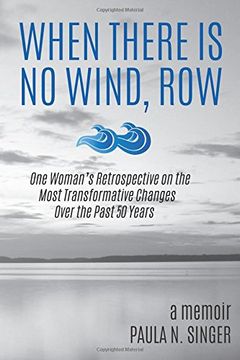When There is no Wind, Row: One Woman's Retrospective on the Most Transformative Changes Over the Past 50 Years (en Inglés)
Reseña del libro "When There is no Wind, Row: One Woman's Retrospective on the Most Transformative Changes Over the Past 50 Years (en Inglés)"
When There Is No Wind, Row tells the story about the remarkable career path Paula N. Singer traveled on her way to achieving her dream of becoming a lawyer. On that journey, social and cultural norms of the day forced her to make many detours – “tacking” in sailing terms - to other careers before continuing on her course to become a lawyer. During the 50-year span of her careers, Singer became an active participant in the computer revolution, the women’s rights movement and the globalization of the economy. Social and cultural barriers were high when Singer began her journey in the 1960s. Women were supposed to become wives and mothers not lawyers. She faced financial barriers as well. Singer tells about growing up poor in the 1950s in Kennebunk, Maine. By the time she graduated from high school, she had lived in eight different places in town. She graduated first in her class, but scholarship awards and a student loan with savings from her summer jobs didn’t cover her first-year college costs. She left for college not knowing how she would make it through financially after receiving a pep talk from her history teacher about working out her finances a semester at a time. She tells stories about how she did that while married and supporting her widowed mother by her junior year. With law school thwarted by the lack of financial aid for women for professional schools and with no financial aid awarded to her for graduate school, Singer began her journey with a job search in Boston in 1966. Singer’s stories are a vivid reminder of how far women have progressed since then when want ads were segregated by “Male/Female,” all the jobs with good career opportunities were under “Male” and companies refused to interview women for those jobs. Singer describes how she got interviews for good jobs through an employment agent who failed to disclose she was female. She arrived for her first interview, for executive assistant to the founder and president of a major company, only to be told, he “refuses to interview a woman.” She had the second scheduled interview at an insurance company after a seven-hour wait. She finally landed a job as computer programmer even though she didn’t know what a computer was. Her qualification for the job – she could play bridge! Singer describes learning how to program the UNIVAC III, an early business computer, with no computer science courses and the only debugging tool her deductive reasoning. Using stories and conversations, Singer takes us through her move back to Maine, birth of a daughter, and continuation of her computer career, overcoming barriers to become her employer’s first female systems analyst. Divorced and supporting her daughter and mother, she left for law school when student aid for women became available after passage of Title IX of the Civil Rights Act in 1972. She married again while in law school and gave birth to another daughter after a move back to the Boston area. Singer describes what it was like for a lawyer with her unusual “credentials” – female, mid-30s, married, a mother, a public school education and a prior career - trying to break into the legal profession in Boston. With barriers too high to overcome, she tacked to a unique job with the consulting firm, Arthur D. Little, Inc. supporting the company’s international personnel and projects at the outset of economic globalization. At age 40, she finally began practicing law, building up an international tax practice well before fax, email and the Internet. But her stories don’t end there. At age 50, she parlayed her tax, immigration and computer experience to found and operate a successful tax software company with her husband. Singer includes her recollections of, and connections to, historical events from President Kennedy’s assassination in 1963 to the Boston Marathon bombing in 2013, and, on a more positive note, the first US performance by the Beatles. Also included are profiles of many pioneering women.

